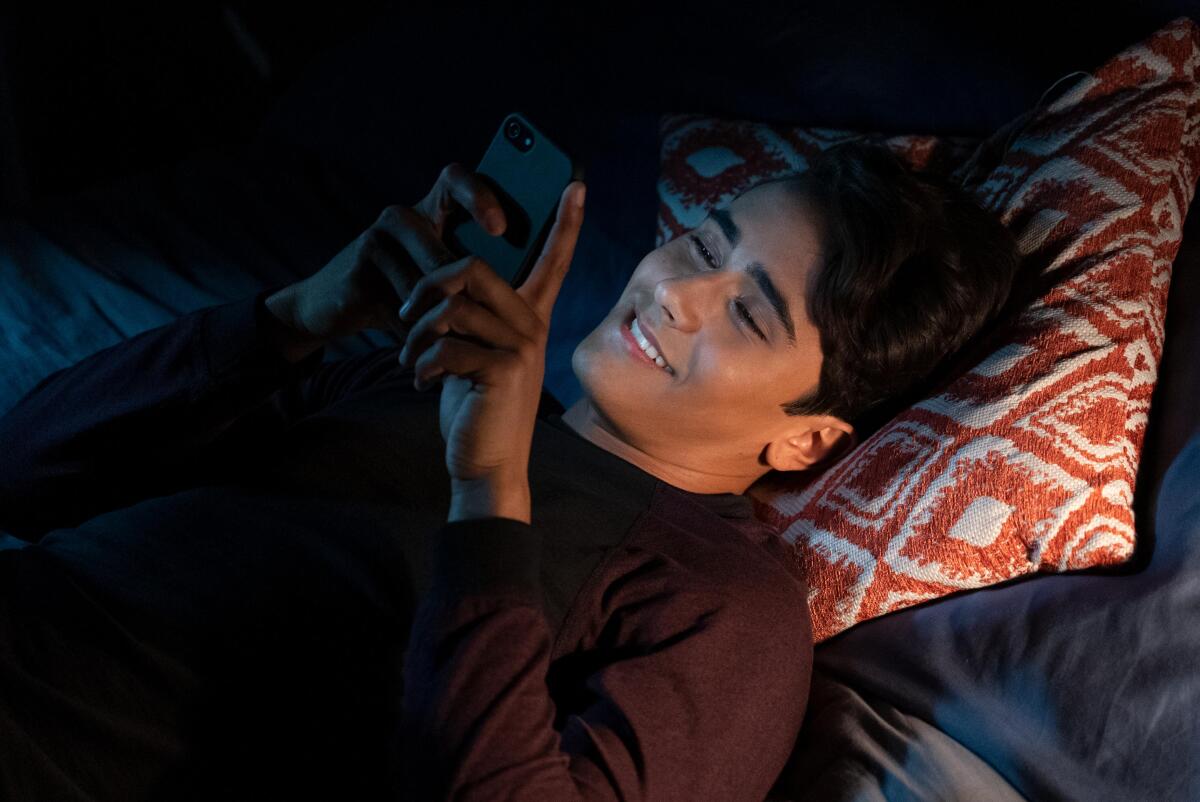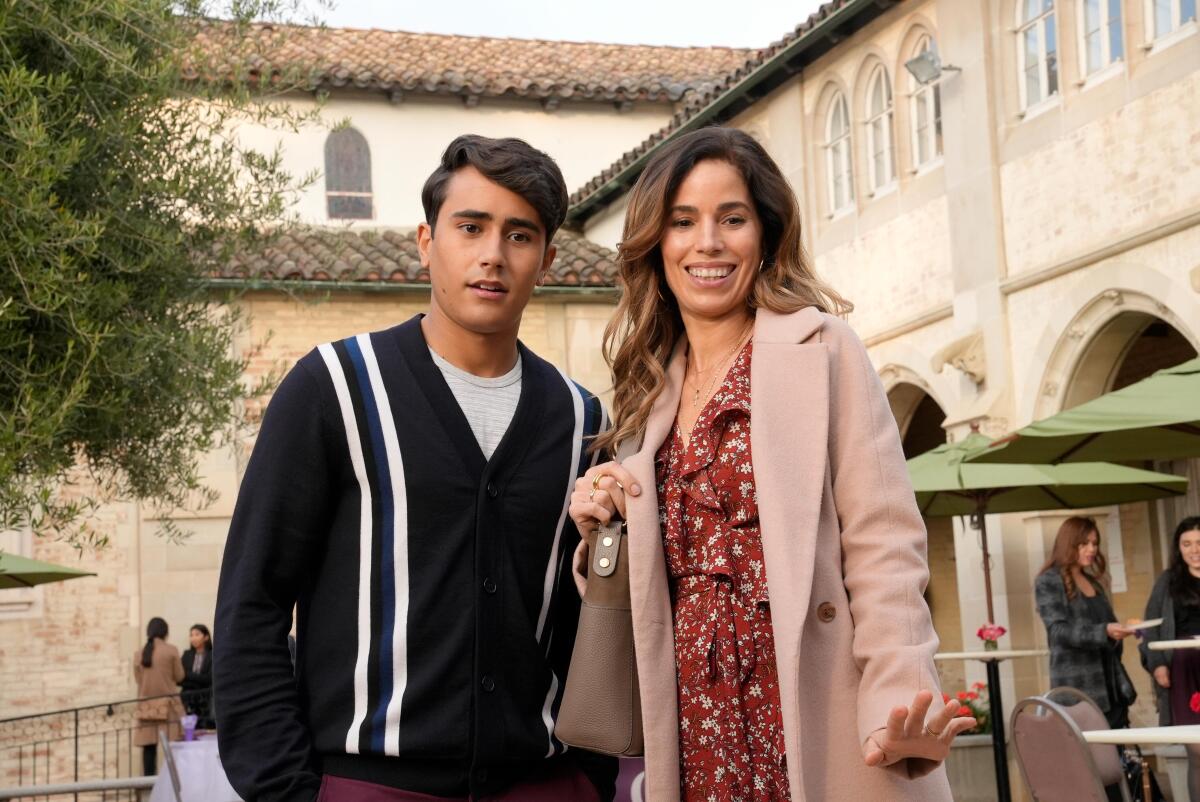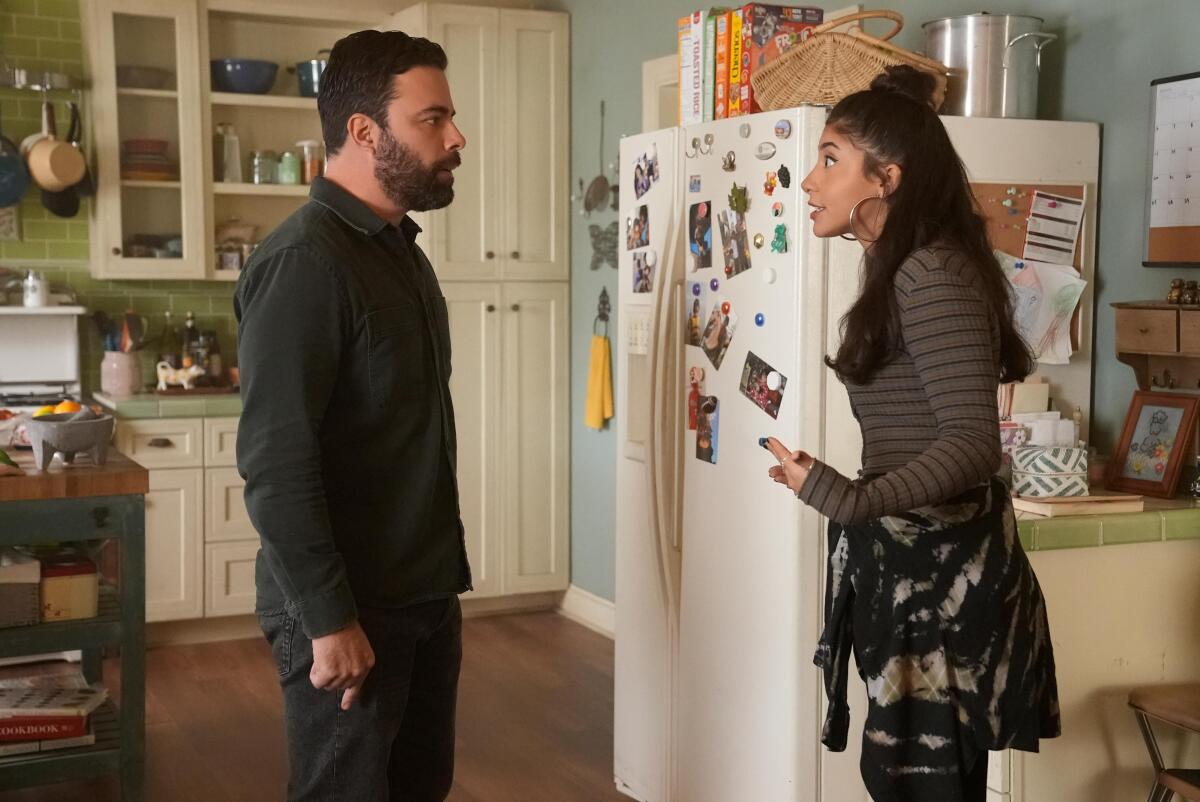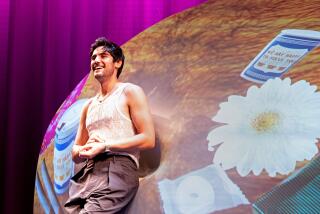‘Love, Victor’ broke new ground in LGBTQ TV. Inside its ‘very poetic’ finale

- Share via
Warning: The following contains spoilers for the third and final season of “Love, Victor.”
For Victor Salazar (Michael Cimino), the charming teen protagonist of Hulu’s “Love, Victor,” all roads lead back to Creekwood High’s annual Winter Carnival.
In the “Love, Simon” spinoff’s series finale, Victor accepts the school’s inaugural “bravery” award and pays tribute to the peers who have become an invaluable part of his coming-out journey: his neighbor-turned-best-friend, Felix (Anthony Turpel); his ex-girlfriend, Mia (Rachel Hilson); and his first love, Benji (George Sear), who arrives unannounced at the carnival later that night to declare that he wants to give their relationship another shot.
The ending — which is a callback to both “Love, Simon” and the “Love, Victor” pilot, in which a newly transplanted Victor couldn’t muster up the courage to ask Benji to ride the Ferris wheel with him — made the most sense to co-creators Isaac Aptaker and Elizabeth Berger, who decided to call time on the hit teen dramedy after three seasons.
“It really does feel to us like a high school show, and that’s sort of always what it was built to be,” Berger tells The Times. Following the characters at the age “when you’re finding yourself and in such a stage of discovery felt so specific in terms of what we wanted the show to tackle.”
A Times analysis has found that Latino representation in film and TV has stagnated for a decade-plus, even as Latinos’ share of the population has grown.
A love triangle, resolved
At the end of last season, Victor unwittingly found himself at the center of a love triangle between Benji and Rahim (Anthony Keyvan), a stylish, sharp-witted student who confided in him about coming out to his Muslim parents. Ultimately, Victor chose Benji — and continued to choose him, despite sharing a connection with Rahim and rebounding with Nick (Nico Greetham) — because as complicated as things got, Victor wasn’t ready to walk away, Berger says. So many of their difficulties, which stemmed from their own families and Benji’s sobriety, “seemed like things that they could overcome. And at the end of the day, he just remained madly in love with him.”
“I feel like Victor’s ending is very poetic,” Cimino says. “Life is not all about being in love and being in relationships. Sometimes it’s about just being by yourself and figuring things out, and Victor finally did that. He learned how to find himself, and then in finding himself, he was able to find Benji again and let him back into his life.”
While Victor decides that he and Rahim are better off as friends, Berger says she believes “your close friends in high school are arguably as important as the person that you’re in love with” and hopes viewers, who will inevitably be divided, will take comfort in knowing that “there will still be an intense love there — even though it’s not a romantic love — and that these two will be on each other’s journeys as they continue through life.”
After overcoming his disappointment, Rahim comes into his own and initiates a series of important conversations with his mother about his personal life and how damaging it feels to be forced back into the closet in the presence of his conservative relatives from Iran. “The way he’s able to say, ‘This is what I need,’ and ‘Don’t ever do that again’ — he really holds his own,” Aptaker says, adding that Rahim does find happiness in the end with Connor, a student at another school.

‘She chose her son’
Victor’s parents, Isabel (Ana Ortiz) and Armando (James Martinez), were on the verge of divorce in the first two seasons. But the fact that they handled Victor’s coming out in contrasting ways “forces them both to look inwards at their own communication skills,” explains Berger. The process of attempting to reconnect with their gay son “makes them better partners to each other,” leading to their decision to start a family business together in the finale.
For Ortiz, who played the fiercely protective mother of a gay son on ABC’s “Ugly Betty” and was raised Catholic in a progressive part of New York City, playing Isabel, a devout woman who has to grow into her acceptance of her son’s sexuality, has been an unexpected gift.
To this day, being gay is still “very much stigmatized” due to the machismo in Latino communities, says Ortiz. “I’ve gotten so much love from people saying, like, ‘This has really opened the door for me, and I’m able to sit down with my mother, or my aunt, or my cousins, or my grandparents.’ It’s a shame it took this long, [but] it feels so great to be able to have this conversation.”
In Isabel’s case, “She really has to compartmentalize” and prioritize her own family by following religious teachings that encourage love and acceptance, Ortiz says. “I don’t know that there is a full reconciliation [between] her Catholicism [and] her gay son, but I know that she chose her son.”
Cimino, who has talked about the messages he’s received for his portrayal of Victor, hopes that the show will have staying power. The fact that people of different generations have felt, and will continue to feel, empowered enough to come out because of this show “is really all we can ask for” and “crazy to think about,” he says.
In “Boys’ Trip,” Hulu spinoff series “Love, Victor” expands the range of queer identities in the movie “Love, Simon” — thanks to the writers’ own experiences.
Being brave ‘means you embrace the scary’
When Victor and his family moved from rural Texas to Atlanta, he was still coming to terms with his sexuality. But a year — or three seasons — later, he gives a schoolwide speech “about the importance of declaring who you are and embracing how scary that is,” and his story is the driving force that compels his family and friends “to make the right choices for them,” Aptaker says.
Following the events of last season, Felix begins dating Victor’s sister, Pilar (Isabella Ferreira). But after they are caught by her parents, Pilar realizes that her feelings for Felix were “always going to be complicated by how he fits into the rest of her family. He really was like another son; he was adopted into her family,” explains Aptaker. Even if it wasn’t Felix’s fault, those circumstances “meant he would never be able to be her person first and foremost.”
And while Felix briefly entertains the possibility of rekindling his romance with Lake (Bebe Wood), the two exes agree that it’s best to not rehash the past, because they have become fundamentally different people. Not only does Lake discover that she is bisexual and in love with Lucy (Ava Capri) but she is also able to make peace with her mother, who had a history of projecting her own insecurities. Mia, Lake’s best friend, comes to a similar acceptance about her career-oriented father and ultimately decides to move to Palo Alto to live with him, her stepmother and new half-brother — while staying with her devoted boyfriend, Andrew (Mason Gooding).
“It was very important to us with all of our adult/parent characters that they have flaws but that they also be inherently good and trying,” Berger says. “I think our young characters this season seeing their parents more clearly and being able to come to terms with those flaws was something we were really interested in exploring.”

‘The future looks bright for us’
Shot at Calamigos Ranch in Malibu, the final scenes of “Love, Victor” served as the perfect bookend to a life-changing period for the actors, who “fell in love with each other offscreen,” Aptaker says. “This was the end of this three-year chapter of their life where, for a lot of them, it really put them on the map.”
Cimino admitted that the memory of that final night still makes him emotional. “I said this in my speech when we wrapped — I feel like I do deserve so much more now because of this show. And for such a long time, as an actor and as an artist, you feel like you don’t deserve the blessings that you receive, and this show really made me understand that I did deserve everything that happened.”
Ortiz, who was struck by her younger co-stars’ creative ambitions, has “really high hopes for this group of young folks” as they go on to tell more stories. Starring in a Latino-led show in particular “helped these kids understand that anything is possible,” she says. “I really think the future looks bright for us, because there’s a lot of kids on the come-up that are ready for their moment.”
Although this chapter of Victor’s story is over, Berger and Aptaker, who have their own theories about what might happen to their characters in adulthood, would not rule out a return to Creekwood, or a reunion special, in the future. Cimino, if approached, says he would “definitely entertain” the idea of reprising his groundbreaking role one day.
“When you love something and have so much fun doing it — and we truly believe this franchise has been important to a lot of people and touched their lives — you never say no to the chance to keep on doing it,” Aptaker says. “Whenever there’s a commercial success about underrepresented communities, it just paves the way for more of those stories to be told, because this is ultimately a business. Whenever you can prove that telling these stories draws an audience and creates a profit, it just opens more doors.”
More to Read
The complete guide to home viewing
Get Screen Gab for everything about the TV shows and streaming movies everyone’s talking about.
You may occasionally receive promotional content from the Los Angeles Times.






